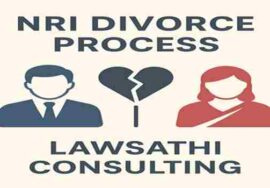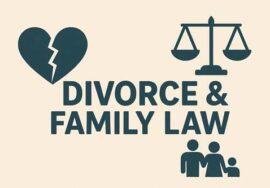Divorce by Mutual Consent
Divorce by Mutual Consent is the simplest and fastest way to legally end a marriage in India, under Section 13B of the Hindu Marriage Act, 1955 (or under the relevant personal law for other religions).
Here’s a brief overview of the process:
Basic Requirements
Mutual Agreement: Both husband and wife agree to divorce. They filed a joint petition for mutual divorce.
Separation Period: They must have lived separately for at least 1 year before filing the petition.
No Possibility of Reconciliation: Both must believe that the marriage has irretrievably broken down. They do not want to live together anymore.
Procedure for Mutual Divorce
First Motion Petition: Joint petition filed in Family Court. Statement of both parties recorded.
A court may suggest mediation, but if the parties are firm, it proceeds. Mediation is possible if any chance to resolve a dispute, but the parties have already decided to divorce.
The court grants a 6-month cooling-off period (parties can apply to waive in some cases).
Second Motion Petition (After 6 Months): Filed after 6 months and within 18 months of the first motion. Final statements are recorded. If both still consent, the court passes the Decree of Divorce.
Key Points to Cover in Petition
Alimony/Maintenance (if any)
Child custody (if applicable)
Division of assets and property
Withdrawal of any pending complaints/cases
Parties agree to take a divorce, and they can apply to waive the Cooling-off period by a court under special circumstances (Hon’ble Supreme Court judgment – Amardeep Singh v. Harveen Kaur, 2017).
Applicable Laws
Hindus: Hindu Marriage Act, 1955
Muslims: Dissolution under personal law or mutual agreement.
Christians: Indian Divorce Act, 1869
Others or interfaith couples: Special Marriage Act, 1954
The Hindu Marriage Act, 1955
13B. Divorce by mutual consent.—(1) Subject to the provisions of this Act a petition for dissolution of marriage by a decree of divorce may be presented to the district court by both the parties to a marriage together, whether such marriage was solemnized before or after the commencement of the Marriage Laws (Amendment) Act, 1976 (68 of 1976), on the ground that they have been living separately for a period of one year or more, that they have not been able to live together and that they have mutually agreed that the marriage should be dissolved.
(2) On the motion of both the parties made not earlier than six months after the date of the presentation of the petition referred to in sub-section (1) and not later than eighteen months after the said date, if the petition is not withdrawn in the meantime, the court shall, on being satisfied, after hearing the parties and after making such inquiry as it thinks fit, that a marriage has been solemnized and that the averments in the petition are true, pass a decree of divorce declaring the marriage to be dissolved with effect from the date of the decree.]
Disclaimer: This article is for educational and informational purposes only. It provides a general understanding of legal remedies but does not constitute legal advice. For specific legal guidance, you can consult a legal expert.




